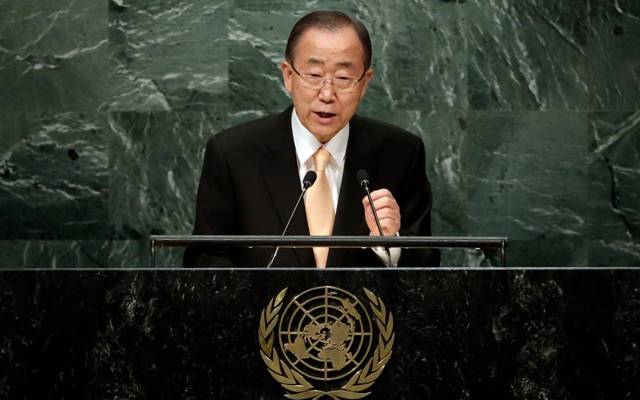Israel’s Ambassador to the UN Danny Danon slammed Secretary-General Ban Ki-moon’s address to the UN General Assembly after the UN chief chose to criticize Israel once again “instead of focusing on Palestinian terror and incitement, and instead of compelling [Palestinian Authority head] Mahmoud Abbas to return to the negotiating table.”
Israel’s Ambassador to the United Nations (UN) Danny Danon on Tuesday reacted harshly to Secretary-General Ban Ki-moon’s opening address at the United Nations General Assembly, calling his approach an “obsession” with Israel.
Ban focused his words primarily on the civil war in Syria, but left room for criticism of Israel while neglecting to address a broad array of issues which really require the UN’s attention. “Ten years of illegal settlement expansion and fifty years of occupation. This is madness. The Palestinians cannot continue to live under Israeli occupation,” Ban declared.
“The real madness belongs to the UN,” Danon charged. “Instead of focusing on Palestinian terror and incitement, and instead of compelling [Palestinian Authority head] Mahmoud Abbas to return to the negotiating table, the Secretary-General chose to criticize Israel once again. This is an obsession with Israel and it must end.”
“At a time when Palestinian terror is on the rise in Israel, the Secretary-General chose to criticize us and ignore the direct responsibility of Abbas and the Palestinian leadership who continue to incite towards terror,” Danon added.
Israel has been experiencing a new surge of Palestinian terror attacks. Israeli security officials estimate that the new outbreak of violence, which really started last year, is the result of incitement and hate the terrorists were exposed to during the Muslim holiday of Eid al-Adha last week.
While Ban posits that Israel’s presence in Judea and Samaria is “illegal” and is considered “occupation,” the reality is quite different.
Israel returned to Judea and Samaria and united its capital Jerusalem during the 1967 Six Day War. The Palestinians want the territory for their future state, along with the Gaza Strip and east Jerusalem as their capital, and deny the Jews’ ancestral and biblical connection to these lands.
Jews have been living in those areas for centuries, and their presence does not undermine prospects for peace. Israel blames failed peace efforts on Arab refusal to recognize Israel and their denials of the Jewish historical connections to the land.
Some 120 communities have been built in Judea and Samaria, now home to more than 400,000 Israeli Jews. Some 200,000 Israeli Jews live in the eastern side of Jerusalem, which Israel annexed and considers part of its eternal, undivided capital.
The Palestinians, along with part of the international community, view Israel’s presence in Judea and Samaria as illegal or illegitimate. They claim the growing number of Israelis makes it increasingly difficult to establish their own state in these territories.
By: Max Gelber, United with Israel
Do You Love Israel? Make a Donation - Show Your Support!
Donate to vital charities that help protect Israeli citizens and inspire millions around the world to support Israel too!
Now more than ever, Israel needs your help to fight and win the war -- including on the battlefield of public opinion.
Antisemitism, anti-Israel bias and boycotts are out of control. Israel's enemies are inciting terror and violence against innocent Israelis and Jews around the world. Help us fight back!




